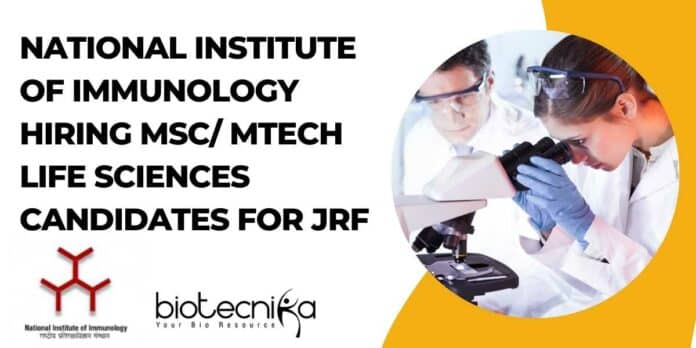tyle="text-align: center;">NII MTech MSc Life Sciences JRF Job – Attend Walk-In
NII MTech MSc Life Sciences JRF Job – Attend Walk-In. The National Institute of Immunology is inviting applications Junior Research Fellow (JRF) Position. Interested candidates Check out the details below and Apply Online
This job expires in
NATIONAL INSTITUTE OF IMMUNOLOGY
ARUNA ASAF ALI MARG
NEW DELHI
ADVERTISEMENT FOR WALK-IN-INTERVIEW
Name of the Position: Junior Research Fellow (Project)
Name of the Project: “Targeting liver-to-colon inflammatory axis”, a novel strategy to limit diet triggered Inflammatory bowel disease development” funded by ICMR
Duration: Six-months (6 months)
Name of the Project Investigator: Dr. Devram S. Ghorpade, Staff Scientist-IV,
Immuno Inflammation Laboratory
Email ID of Project Investigator: [email protected].
Date of Walk-In-Interview: 04th August 2023 (Friday) (Through Online Mode). Candidates must apply for the above position up to 03.08.2023, to consider their application. Only shortlisted candidates will get the online link for attending the Interview.
PLEASE NOTE:
- CANDIDATE MAY FILL UP THE APPLICATION FORM IN THE PRESCRIBED FORMAT ALONG
WITH NECESSARY DOCUMENTS FOR VERIFICATION. - APPLICATIONS FORMS CONTAINING INCOMPLETE INFORMATION SHALL NOT BE
ENTERTAINED. - THE DATE OF PASSING THE EXAMINATIONS MUST BE INDICATED CLEARLY.
- ONLY REGISTERED CANDIDATES WILL BE INTERVIEWED.
- NO TA/DA WILL BE PAID FOR ATTENDING THE INTERVIEW.
Emoluments: Rs. 31,000/- per month + 27% HRA (As per funding agency norms)
Educational Qualifications: M.Sc./M.Tech degree in any area of Life Sciences/Chemical Sciences with a good academic record. M.Sc. candidates should have qualified for any National Level Eligibility Test such as (NET/GATE etc.) for applying for the above position.
Desirable: The JRF will perform the experiments to maintain cell culture, production of AAV viruses, quantification, in vivo silencing using mouse models, qPCR analysis of genes, western blotting of proteins, data documentation, and maintenance of laboratory records.
Job Description: The preference will be given to candidates who have hands-on experience in the following areas: Cell biology (bacterial and cell culture), handling of mouse models, and organ harvesting, and are well-versed in molecular biology techniques.
Check the notification below
National Institute of Immunology Hiring MSc Candidates for JRF Post. Here are Possible interview questions and answers :
1. Question: Can you tell us about your experience in cell biology and molecular biology techniques? Answer: Certainly. I have hands-on experience in cell biology, including bacterial and cell culture techniques. During my M.Sc. program, I worked extensively with cell lines and primary cell cultures to study cellular behavior under different conditions. Additionally, I have practical knowledge of various molecular biology techniques, such as qPCR analysis of genes and western blotting of proteins. I have used these techniques to investigate gene expression patterns and protein levels in response to different stimuli. My research projects have provided me with valuable skills in these areas, and I am eager to apply them to the “Targeting liver-to-colon inflammatory axis” project.
2. Question: Have you worked with mouse models before, and if so, could you describe your experience with handling them and conducting experiments? Answer: Yes, I have experience working with mouse models during my M.Sc. research. I was involved in the design and execution of experiments that required in vivo studies using mouse models. This included the administration of experimental agents, behavioral assessments, and organ harvesting. I also have experience in in vivo silencing techniques using mouse models. I ensured compliance with ethical guidelines and maintained detailed records of all experimental procedures. I understand the importance of accurate data documentation and maintaining laboratory records to ensure the reliability of research outcomes.
3. Question: How familiar are you with AAV virus production and its applications in research? Answer: I am quite familiar with AAV virus production and its significance in research. AAV (Adeno-Associated Virus) is commonly used as a vector to deliver genetic material into cells for various experimental purposes. During my M.Sc. studies, I worked on projects involving the production and purification of AAV viruses for gene delivery experiments. I understand the critical steps involved in AAV production and the need for meticulous quality control to obtain high-quality viral particles. I am confident in my ability to contribute to the production of AAV viruses and its application in the “Targeting liver-to-colon inflammatory axis” project.
4. Question: How did you qualify for the National Level Eligibility Test (NET/GATE)? Can you elaborate on your preparation and performance? Answer: I qualified for the National Level Eligibility Test (NET) during my M.Sc. program. To prepare for the exam, I dedicated several months to rigorous studying and practice. I focused on thoroughly understanding the core concepts of my field, including life sciences and relevant topics in chemical sciences. I also solved previous years’ question papers and took mock tests to assess my progress and identify areas for improvement. The hard work paid off, and I was able to clear the NET with a good score. The experience of preparing for the exam has strengthened my knowledge base and analytical skills, which I believe will be valuable in contributing to the research project.
5. Question: Can you share an example of a challenging situation you encountered during your previous laboratory work, and how did you overcome it? Answer: During my previous laboratory work, I faced a challenging situation when a critical piece of equipment malfunctioned just before an important experiment. It could have jeopardized the entire project timeline. To overcome this, I immediately informed my supervisor about the issue and explored alternative solutions. While waiting for the equipment to be repaired, I collaborated with a colleague from a different lab to conduct some initial experiments using their equipment. This allowed us to gather preliminary data and keep the project moving forward. Additionally, I used the time to review and optimize the experimental protocol, which ultimately improved the overall efficiency of the study. The experience taught me the importance of adaptability and resourcefulness in research settings.
Editor’s Note: NII MTech MSc Life Sciences JRF Job – Attend Walk-In. Please ensure you are subscribed to the Biotecnika Times Newsletter and our YouTube channel to be notified of the latest industry news. Follow us on social media like Twitter, Telegram, Facebook






























